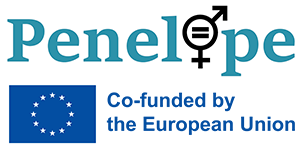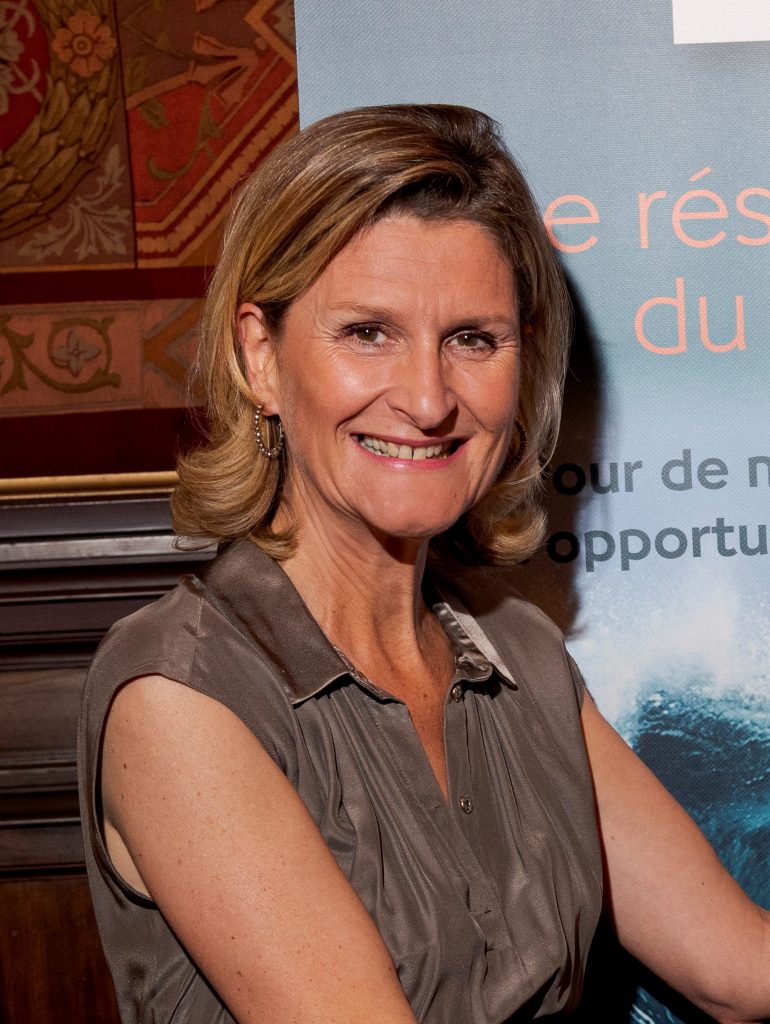


Could you please introduce yourself ?
I chair the Women’s International Shipping & Trading Association (WISTA) in France since 2018, and I am also French Foreign Trade Advisor, Member of the Board of France Clusters. Since 2007, I work for the French Maritime Cluster (FMC) as Deputy Director, in charge of administration, finance and the international development. Among her missions in the Cluster, she leads thematic working groups, including one on gender equality in the workplace, which has resulted in numerous actions.
I am a woman of action and networks, full of energy to steer, lead and move projects forward, in particular by promoting the expertise, skills and talents of women.
Could you please describe your organization in a few words?
Created in 2006, the French Maritime Cluster brings together all the players in the maritime ecosystem, from industry to all types of maritime services and activities. The FMC serves its 480 entities (companies of all sizes, competitiveness clusters, federations and associations, laboratories and research centers, education and training organizations, local authorities and economic players, as well as the French Navy) as a facilitator for the development of their business and the emergence of innovative projects. It supports its members in the sustainable and responsible development of their activities and projects in France and abroad.
Could you give us some facts and figures, or a description of the status-quo related to the situation of gender equality in your country/region and/or sector? What are the challenges encountered?
Today, women represent only 21% of maritime employment in France, according to last figures from the Observatory on gender professional equality (“Observatoire Cap sur l’égalité professionnelle”) which has been created in 2015 by the French Maritime Cluster.
Globally, according to the 2021 Seafarer Workforce Report published by BIMCO and ICS, the number of women serving as seafarers is estimated at only 1.2%, or approximately 24,059, which represents an increase of 45.8% compared to 2015.
The challenges on professional equality in the maritime sector are:
1) Attractiveness of education/training and professions of the maritime sector: Due to a lack of knowledge, young people do not go into these professions, and this is even more the case when they are girls because of prejudices and preconceived ideas. The challenge is to break down these stereotypes and prejudices and therefore to make schoolgirls and high-school students aware of the interest of technical and engineering professions. Thus, the sector will give itself the means to have a pool of female talents.
2) Retain female HR in the sector: Various studies have shown that companies who have mixed teams perform better. Employers shall seek gender balance at all levels. With equal skills they shall offer female HR equal salaries to male HR, as well as training and carrier development opportunities while managing their pregnancies periods and facilitating their return to work to retain these talents in the maritime sector.
3) Feminization of governance bodies: For several years, the public authorities have implemented various measures to promote a more balanced representation of women in the professional world and in particularly in governance positions. French laws (Rixain in 2021) apply to companies (according to their number) to accelerate the balanced representation. That means by 2030 women shall be better represented in the governance bodies of all public and private organizations in the maritime sector.
4) Fight against harassment/sexist and sexual violence: Measures to prevent and protect female HR against harassment/sexist and sexual violence shall be implemented or strengthened.
If we tackle all these four issues at the same time, we can really make things change.
Could you please indicate what levers you see to address these challenges or to improve the situation you just described? Where do you see clusters playing a role in the process?
When it has a certain notoriety and is recognized for its various actions, the cluster can create a dynamic, a ripple effect by guiding and supporting companies. It brings together actors to make them think about a common theme so that lessons can be learned, a source of inspiration and ideas for new action projects and partnerships can emerge.
On professional equality, the French Maritime Cluster created the Observatory on gender professional equality in the maritime sector (“Observatoire Cap sur l’égalité professionnelle”). It also created factsheets of good practice on key levers for professional gender equality (salaries, recruitment, promotion, carrier management, training, private/professional life balance work conditions, communication) to raise awareness and facilitate their adoption by companies of the sector.
The cluster also organized the operation “Les Elles de l’Océan” to attract talents in the maritime sector.
To go further in the actions and reflection, and in the sharing of experiences, the French Maritime Cluster has created a committee of HR and CSR managers from shipping companies, shipyards, ports and the French Navy. The objective of this committee is to accelerate the feminization of the workforce by sharing good practices in order to inspire each other and the second step is to reflect together on how to overcome the obstacles, what are the levers, tools and solutions. Such committees of HR directors already exist but they are not from the same sector. Therefore, the creation of this sectoral committee of HR and CSR directors is a real added value by the cluster and it is a success considering the excellent participation rate in the 4 meetings organized yearly.
Do companies in your network face recruitment difficulties? Would you say that efforts to create (more) gender equality lead to solutions to overcome these difficulties and why?
All sectors are growing, but all professions are in tension since the end of the COVID. There are not enough applicants in general (men and women) but the ratio of women is extremely low. One of the solutions is to increase the pool of female talents by attracting them in higher education (National Maritime School, Naval School, Engineering Schools, etc.).
In general, there are not enough women, who are engineers and technicians in France, hence the creation of the association “Elles bougent” in 2006. In partnership with the latter, the event “Les Elles de l’Océan” has been developed in 2018 for the maritime sector. During this first edition of “Les Elles de l’Océan”, 17 companies opened their doors. This year’s edition of the event “Les Elles de l’Océan” counted 28 companies participating and more than 1000 young girls (college, high schools, students). This high increase of participation shows the willingness of companies to recruit women through the communication of the actions of “Elles Bougent”.
There are more and more companies that are giving themselves the means to make their jobs known to girls.
Since 2006, “Elles bougent”, a public interest association, has been introducing primary schools, secondary school girls and students to the exciting careers in technological or scientific industrial sectors where there is a lack of female talent: the automotive, aerospace, energy, rail, maritime, digital, defence and construction sectors in particular.
The association “Elles bougent”, sponsored by 6 ministries, brings together 26 regional delegations, 320 corporate and higher education partners, a club of 1,416 secondary schools, and 10,550 sponsors and relays around 500 actions per year that reach approximately 40,000 young women.
Do you think that companies of your cluster, sector/ecosystem, region are aware of gender equality rules? If so, do they know how to comply with these rules? What could be helpful (trainings, webinars, reference person in the company, etc)?
Companies are gradually becoming aware of their obligations. It depends on the size of the company. Large companies are sanctioned if they don’t comply with gender equality laws. But they have departments with competent people to make sure they do comply with their obligations.
It also depends on the managers and whether their personal awareness of the feminization issue, so to implement actions towards more professional gender equality at the level of their companies.
Would you say working on gender mainstreaming can bring solutions to other challenges you observe (retaining female HR in organizations by addressing issues such as equality in wages, work-life balance, fight against sexist acts ; populating rural areas, etc)?
In the maritime sector and others sectors, it is a challenge to attract labour in coastal areas, which suffer in particular from a shortage of housing for young people.
Clusters must better work with regional authorities to make various sectors attractive to women. And regional authorities shall rely on clusters for the successful implementation of actions and the attractiveness of their territory to new labor.
Encouraging collective intelligence between a strong player, such as the regional authority, having the financial and political means to create a attractive framework, and clusters to implement actions is a key success factor.
Sectoral associations of women can also play a key role on the challenge of women being represented in governance bodies. At WISTA France ‘(Women’s International Shipping & Trading Association), we created this year a group of women, who are boards of directors or supervisory boards in the maritime sector (Cercle “Femmes administratrices du Maritime” FAM) to tell the maritime community that there are experienced, competent and expert women to join high responsibilities positions in the sector. Our approach is proactive.
Could you please describe why gender equality is important for you personally and/or for your organization?
“To feel less alone as a woman in the sector, I joined the « Women’s International Shipping & Trading Association » (WISTA) in France to meet other women in the sector. Especially as I am not originally from this sector, which discovered only in the 2000s. Therefore, I can put myself in the shoes of women/girls who are not familiar with this sector and testify about the interest of great jobs.
The fact that I am invited more and more often to give my testimony, not only to professionals but also to the general public, parents, educators, etc. shows that we are in a new era of gender equality. I want to show for example like Anne Cullerre, the first female Vice-Admiral of the French Navy, you can hold the leading positions when you are a woman. We are seeing more and more girls entering the Navy, so it is encouraging.
I am convinced that women and men are complementary and that we cannot deprive ourselves of half the population. If we want a balanced society, we must encourage women and men to fight for gender equality.
The professional world must make even greater efforts to make more room for women at all levels of the companies.
If the economy wants to be even more efficient, sustainable and responsible, it needs women’s skills and talents”.
What would be your closing word? Your main message on advancing gender equality approaches in companies/clusters/public authorities/governments?
From the point of view of women/girls, you have to dare to take on so-called “male jobs”. And also dare to impose yourself tactfully and gently in a male environment. Trust yourself, train yourself, surround yourself with men and women who will help you to progress and understand even better the possible traps and obstacles in your professional environment.
SMEs must also be convinced of the importance and the interest of gender diversity in their teams and give themselves the means to achieve it.
I can see that mentalities are changing. But the mobilization of all public and private actors is essential to accelerate these changes.
I have confidence in the future, I think that by 2030 that we will achieve more gender diversity at all levels in companies, both in large and small companies.


